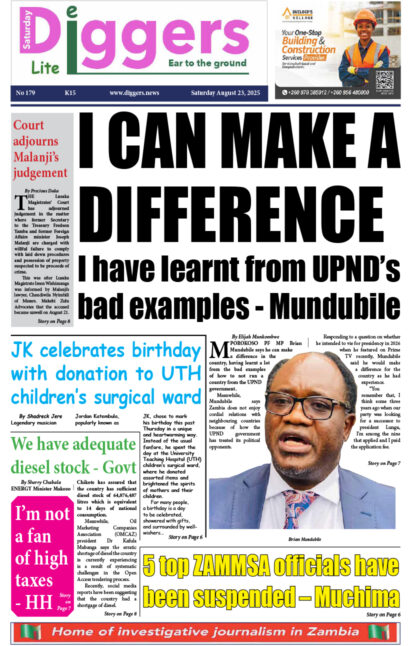The Food Reserve Agency (FRA) may not manage to hit their 300,000 metric tonne strategic reserves buying target on the low K110 price, says National Union for Small-Scale Farmers of Zambia (NUSFAZ) president Dr Frank Kayula.
And Dr Kayula says government risks killing small agro-dealer businesses if they do not plan adequately for the coming 2019/2020 farming season.
According to FRA board chairperson Joe Simachela, the Agency will be purchasing 300,000 metric tonnes this season in strategic reserves after it failed to hit their 500,000 tonne target last year.
But in an interview, Dr Kayula projected that the Agency may not hit their 300,000 metric tonnes target due to the low maize purchasing price of K110 when some private sector players were buying the commodity from farmers at a much higher price.
“We are hoping that they may get something from the northern part of the country where at the moment prices are still a little less than even a K100. There they may get and if they concentrate there, they will reach, but I don’t know whether they will reach the 300,000 metric tonnes target because they should have hammered from the Eastern Province, Central Province, the Copperbelt, where there is a lot of maize right now. But where they have gone, of course, there are a few districts there where there is a lot of maize. If that is their target, they may reach somewhere, but if they are also hoping to get within this catchment, it’s a pipe dream! The farmers will go for the highest bidder, definitely,” Dr Kayula explained.
He, however, commended the Agency for offering an improved maize price compared to last season.
“So, for us we are saying, we are both happy and sad over the announcement of the K110 per 50kg. We are only happy because those that received FISP will make a profit out of that and we are also happy because it’s 64 per cent over and above the K75 we had last season. So, in that regard, we are saying thank you to the government, but we think the government didn’t consider an important aspect of strategic food reserve because if they did, they should be well aware that right now, the price is over that price they have set. A 50Kg bag is now buying at K120, K130 even up to K150! Now, if you go in an arena where the prices are that much and you offer a lower price, and then you have a disadvantage of not giving cash like the others who are giving higher prices and on cash basis, how do you expect to get what you want?” he wondered.
And when asked about the effects of the failure by government to adequately pay agro-input suppliers, Dr Kayula warned that government risked killing small agro-dealer businesses if they did not plan adequately for the next farming season.
“We have killed the go-between we created very nicely. Musika did a very good job with agro-dealers; now, we are slowly slaughtering those and we are removing them from the equation and those small businesses are the ones that help the economy to grow. If all those have nothing to do, it means unemployment will increase tremendously,” cautioned Dr Kayula.
“Government must find some cash so that they (are) able to do these things properly. It’s good to have infrastructure, but it could have been rolled out over a longer period of time and unlocked cash for some of these essential programmes like making sure farmers do their farming on time, ensuring that suppliers are paid. Suppliers are being owed and I don’t know which suppliers are going to give out again on credit when they are still owed. Right now, they have only been given very little, K74million or something like that, to purchase the crop and we don’t know what is in the plans to purchase the inputs or even to do other things because what I have seen in their advert is that most likely than not, they are going to use the DIS where the suppliers supply on credit and government pays later. But I don’t know how much will be put in the market, it is very hard.”
























